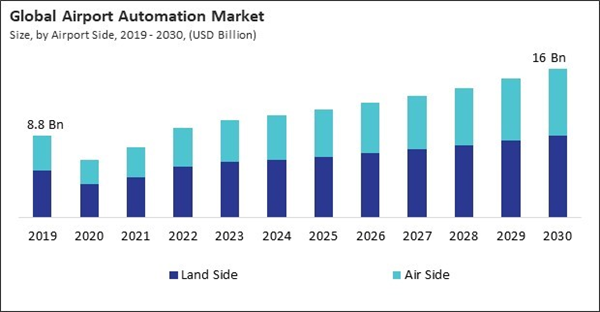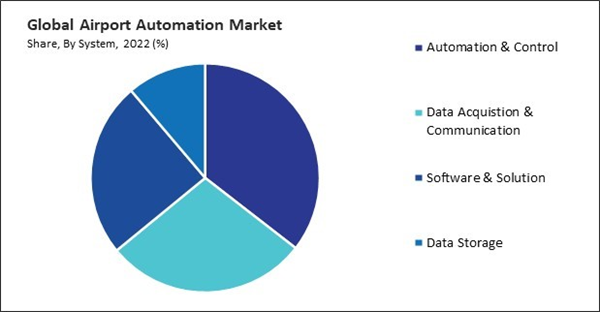As airports strive to handle larger passenger numbers efficiently, there is a greater emphasis on implementing advanced automation solutions for baggage handling and tracking. Thus, the Baggage Handling & Tracking segment acquired $1979.8 million in 2022. Baggage handling and tracking methods have changed significantly as a result of technological improvements.
Instead of typical check-in desks, customers can use self-service check-in kiosks to check in, print boarding passes, and select seats. This information helps airport authorities optimize staffing levels and streamline passenger flows.
Additionally, Automated boarding gates equipped with technology such as barcoded or mobile boarding passes allow for quicker and smoother boarding procedures. Thus, these factors can boost the demand for airport automation in the coming years.
However, upgrading existing airport infrastructure to accommodate advanced automation systems requires substantial investments in retrofitting terminals, integrating smart technologies, and deploying specialized equipment. Thus, these factors can restrain the demand for airport automation in the future.
By Airport Side Analysis
Based on airport side, the market is segmented into land side and air side. The land side segment acquired 57.1% revenue share in the market in 2022. Hence, the segment will witness increased demand in the upcoming years.By Automation Level Analysis
Based on automation level, the market is divided into level 1.0, level 2.0, level 3.0, and level 4.0. The level 2.0 segment recorded a 27% revenue share in the market in 2022. Therefore, these aspects can assist in the expansion of the segment.By System Analysis
By system, the market is segmented into data acquisition & communication, automation & control, data storage, and software & solutions. In 2022, the automation and control segment garnered 35.4% revenue share in the market. Hence, these factors will assist in the growth of the segment.By End Market Analysis
On the basis of end market, the market is divided into greenfield and brownfield. In 2022, the brownfield segment witnessed a substantial 37% revenue share in the market. This phased approach minimizes disruptions to ongoing operations, making it a more feasible and cost-effective option for airports with existing infrastructure.By Application Analysis
On the basis of application, the market is divided into baggage handling & tracking, air traffic management, airfield management, and others. In 2022, the passenger service and assistance segment acquired 13.2% revenue share in the market. Thus, these factors will lead to increased demand in the segment.By Regional Analysis
By region, the market is segmented into North America, Europe, Asia Pacific, and LAMEA. The North America segment procured 36% revenue share in the market in 2022. Therefore, these factors will assist in the expansion of the segment.List of Key Companies Profiled
- Amadeus IT Group SA
- SITA
- Toyota Industries Corporation
- Honeywell International, Inc.
- RTX Corporation
- Siemens AG
- NEC Corporation
- Wipro Limited
- Daifuku Co., Limited
- Thales Group S.A.
Market Report Segmentation
By Airport Side- Land Side
- Air Side
- Level 3.0
- Level 2.0
- Level 1.0
- Level 4.0
- Automation & Control
- Data Acquisition & Communication
- Software & Solution
- Data Storage
- Greenfield
- Brownfield
- Baggage Handling & Tracking
- Air Traffic Management
- Passenger Service & Assistance
- Ground Transportation & Parking
- Facility Management
- Emergency Response & Safety
- Airfield Management
- Ground Support Equipment
- Retail, Dinning & Others
- North America
- US
- Canada
- Mexico
- Rest of North America
- Europe
- Germany
- UK
- France
- Russia
- Spain
- Italy
- Rest of Europe
- Asia Pacific
- China
- Japan
- India
- South Korea
- Singapore
- Malaysia
- Rest of Asia Pacific
- LAMEA
- Brazil
- Argentina
- UAE
- Saudi Arabia
- South Africa
- Nigeria
- Rest of LAMEA
Table of Contents
Companies Mentioned
- Amadeus IT Group SA
- SITA
- Toyota Industries Corporation
- Honeywell International, Inc.
- RTX Corporation
- Siemens AG
- NEC Corporation
- Wipro Limited
- Daifuku Co., Limited
- Thales Group S.A.










